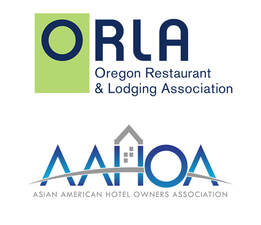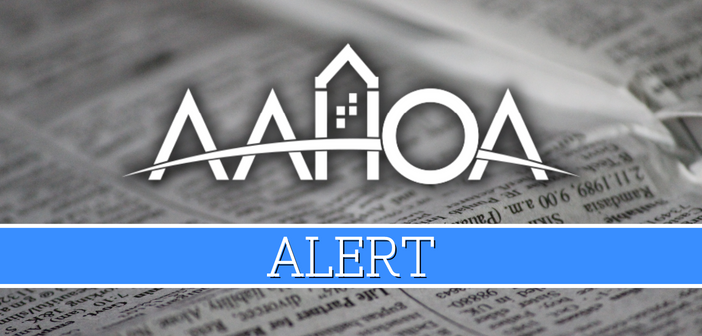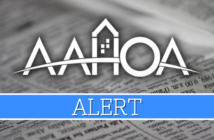Reforms enacted over 20 years ago require ongoing collaboration with local governments across Oregon
Wilsonville, OR – The Oregon Restaurant & Lodging Association (ORLA) and the Asian American Hotel Owners Association (AAHOA) are collaborating to keep a watchful eye on lodging tax spending by local governments across Oregon.
Currently, there are over 100 different local lodging taxes in jurisdictions across the state which generate over $220 million in revenue for city and county governments of all shapes and sizes.
 “The task of staying on top of local lodging tax spending across Oregon is one of our most crucial roles,” said Jason Brandt, President & CEO for the Oregon Restaurant & Lodging Association. “Our friends and joint members at AAHOA are an important national ally. Oregon Asian Americans own 60% of all hotels in the state and as such, AAHOA serves as a critical partner in navigating the various formulas for our industry taxes while monitoring the way in which those dollars are spent in local economies.”
“The task of staying on top of local lodging tax spending across Oregon is one of our most crucial roles,” said Jason Brandt, President & CEO for the Oregon Restaurant & Lodging Association. “Our friends and joint members at AAHOA are an important national ally. Oregon Asian Americans own 60% of all hotels in the state and as such, AAHOA serves as a critical partner in navigating the various formulas for our industry taxes while monitoring the way in which those dollars are spent in local economies.”
Reforms passed in the 2003 Oregon Legislative Session established rules for how local governments can spend industry tax dollars. In short, spending on tourism promotion and tourism-related facilities (defined in state statute) was locked in as a percentage of total lodging tax collections on July 1, 2003. And on July 2, 2003, moving forward, any increase in a local lodging tax rate or establishment of a new lodging tax not already in existence must allocate 70 percent of revenues to tourism promotion and tourism-related facilities with the remaining 30 percent serving as unrestricted revenue for the local government to spend however they see fit.
“It is crucial that local municipalities adhere to state laws mandating the appropriate allocation of local tourism tax revenue,” said Taran Patel, AAHOA’s Northwest Regional Director. “In light of our members’ ongoing recovery from the profound effects of the pandemic, there has never been a more pressing imperative for cities to strategically reinvest tourism tax dollars, leveraging them to actively and effectively promote increased tourism.”
A continual commitment to relationship building with local governments remains a key objective given reforms have now been in place for over 20 years. During that span, cities and counties see ongoing changes in administrator positions and elected official office holders.
“The work we do at ORLA and AAHOA in monitoring lodging taxes starts with city staff and elected leader conversations,” said Brandt. “New administrators often come from other states with little to no familiarity about Oregon’s rules relating to lodging tax. The same is true for volunteer elected officials who cannot be expected to be experts on industry specific issues like lodging taxes at the onset of their service. We’re here to partner whenever possible and determine ways we can grow the pie of revenue overall which benefits both the industry through direct investments in tourism needs while also benefitting the applicable local government by generating more unrestricted tax revenue for city/county budget needs.”
For more information on how local lodging taxes must be expended in accordance with Oregon’s state law, watch the Oregon Lodging Tax Defined video or visit the Oregon Restaurant & Lodging Association’s website at OregonRLA.org.
Currently, there are over 100 different local lodging taxes in jurisdictions across the state which generate over $220 million in revenue for city and county governments of all shapes and sizes.
 “The task of staying on top of local lodging tax spending across Oregon is one of our most crucial roles,” said Jason Brandt, President & CEO for the Oregon Restaurant & Lodging Association. “Our friends and joint members at AAHOA are an important national ally. Oregon Asian Americans own 60% of all hotels in the state and as such, AAHOA serves as a critical partner in navigating the various formulas for our industry taxes while monitoring the way in which those dollars are spent in local economies.”
“The task of staying on top of local lodging tax spending across Oregon is one of our most crucial roles,” said Jason Brandt, President & CEO for the Oregon Restaurant & Lodging Association. “Our friends and joint members at AAHOA are an important national ally. Oregon Asian Americans own 60% of all hotels in the state and as such, AAHOA serves as a critical partner in navigating the various formulas for our industry taxes while monitoring the way in which those dollars are spent in local economies.”Reforms passed in the 2003 Oregon Legislative Session established rules for how local governments can spend industry tax dollars. In short, spending on tourism promotion and tourism-related facilities (defined in state statute) was locked in as a percentage of total lodging tax collections on July 1, 2003. And on July 2, 2003, moving forward, any increase in a local lodging tax rate or establishment of a new lodging tax not already in existence must allocate 70 percent of revenues to tourism promotion and tourism-related facilities with the remaining 30 percent serving as unrestricted revenue for the local government to spend however they see fit.
“It is crucial that local municipalities adhere to state laws mandating the appropriate allocation of local tourism tax revenue,” said Taran Patel, AAHOA’s Northwest Regional Director. “In light of our members’ ongoing recovery from the profound effects of the pandemic, there has never been a more pressing imperative for cities to strategically reinvest tourism tax dollars, leveraging them to actively and effectively promote increased tourism.”
A continual commitment to relationship building with local governments remains a key objective given reforms have now been in place for over 20 years. During that span, cities and counties see ongoing changes in administrator positions and elected official office holders.
“The work we do at ORLA and AAHOA in monitoring lodging taxes starts with city staff and elected leader conversations,” said Brandt. “New administrators often come from other states with little to no familiarity about Oregon’s rules relating to lodging tax. The same is true for volunteer elected officials who cannot be expected to be experts on industry specific issues like lodging taxes at the onset of their service. We’re here to partner whenever possible and determine ways we can grow the pie of revenue overall which benefits both the industry through direct investments in tourism needs while also benefitting the applicable local government by generating more unrestricted tax revenue for city/county budget needs.”
For more information on how local lodging taxes must be expended in accordance with Oregon’s state law, watch the Oregon Lodging Tax Defined video or visit the Oregon Restaurant & Lodging Association’s website at OregonRLA.org.
About ORLA
The Oregon Restaurant & Lodging Association (ORLA) is the leading business association for the foodservice and lodging industry in Oregon, which is comprised of over 10,220 foodservice locations and 2,000 lodging establishments. As of December 2023, the Oregon Employment Department reports the Leisure and Hospitality workforce totals 208,700 with a total economic impact of over $13.8 billion in annual sales for Oregon.
The Oregon Restaurant & Lodging Association (ORLA) is the leading business association for the foodservice and lodging industry in Oregon, which is comprised of over 10,220 foodservice locations and 2,000 lodging establishments. As of December 2023, the Oregon Employment Department reports the Leisure and Hospitality workforce totals 208,700 with a total economic impact of over $13.8 billion in annual sales for Oregon.



